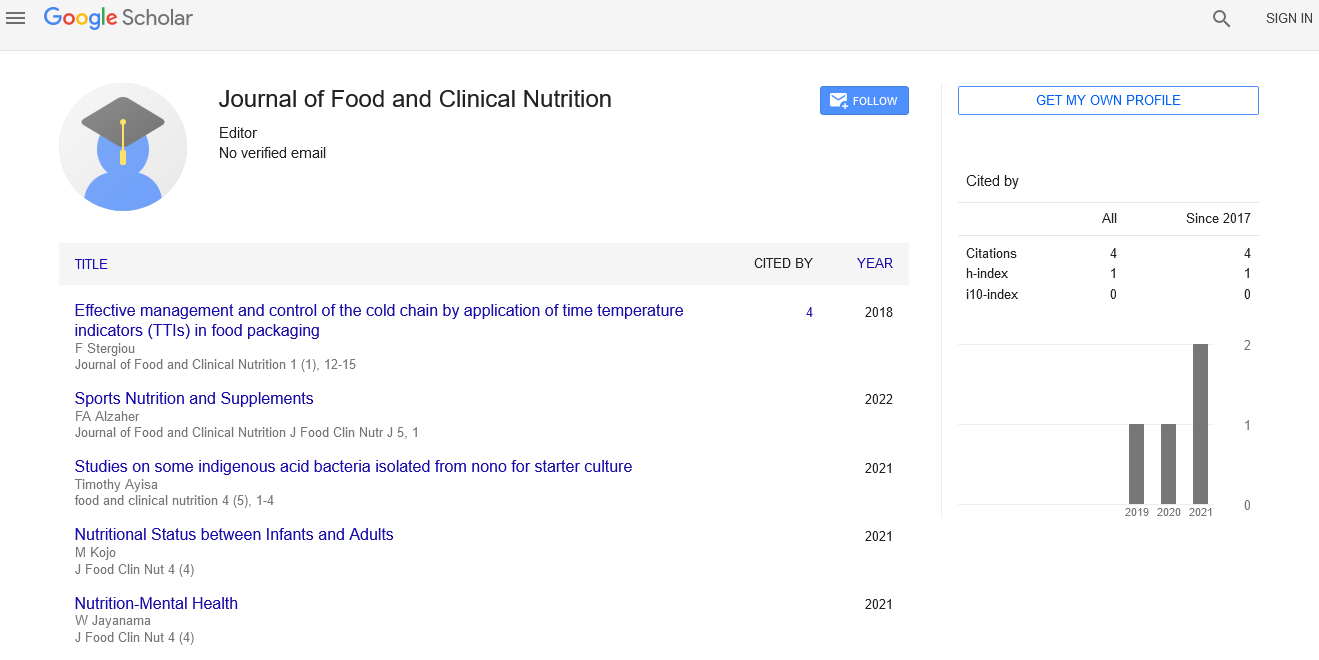
Sign up for email alert when new content gets added: Sign up
Sugar-induced metaflammation: a comparative analysis between dietary fructose and galactose and protective effects evoked by prebiotic fructo-oligosaccharides in rats
3rd Annual Congress on Food Science Nutrition & Women's Health
December 06, 2022 | Webinar
Debora Collotta, Carlo Murzio, Eleonora Aimaretti, Manuela Aragno, Raffaella Mastrocola, Jan Frank, Massimo Collino, Fidele Almasri
University of Turin, Italy University of Hohenheim, Germany
ScientificTracks Abstracts: J Food Clin Nut
Abstract :
Fructose and galactose are among the most consumed carbohydrates. We recently demonstrated that high fructose intake induces the accumulation of advanced glycation end products (AGEs), which in turn contributes to the development of metaflammation and lipogenesis in liver and skeletal muscle. The impact of galactose on AGEs accumulation, related metaflammation and de novo lipogenesis has not yet been investigated. We thus aimed to investigate the intrinsic ability of the two sugars to exacerbate the deleterious effects of a chronic-fat diet and to identify differences in the activation of inflammatory and lipogenic pathways in target organs of metabolic derangements. We further tested the potential efficacy of complex carbohydrates, namely the fermentable dietary fiber Fructooligosaccharides (FOS), to counteract these effects. Male Sprague-Dawley rats (6/group) were fed 8 weeks as follows: 1) Control 5% fat diet (CNT), 2) 20% fat diet (FAT), 3) FAT+10%FOS, 4) FAT+25% galactose (GAL), 5) GAL+10%FOS, 6) FAT+25% fructose (FRU) 7) FRU+10%FOS. Chronic exposure to 20% fat in the presence or absence of simple carbohydrates did not significantly affect body weight gain, blood glucose and lipids or markers of systemic inflammation (TNF-alpha, CRP), whereas an increase in transaminases concentrations was detected in FRU and GAL groups compared to CNT. FOS administration counteracted the increase in markers of liver injury. At local level (liver and skeletal muscle) we documented a sugar-induced significant increase in markers of inflammation and lipid impairment and protection evoked by FOS. Although feeding rats with a diet enriched in both fat and sugars did not result in significant changes at systemic level, we demonstrated that the exposure to sugar evokes changes in the expression of markers of inflammation and lipogenesis, thus confirming their role as triggers of diet-induced metabolic derangements. The concurrent administration of the prebiotic FOS dampened the sugar-induced local metaflammation and lipid accumulation.
Recent Publications :
1. Wouters K, Cento AS, Gaens KH, Teunissen M, Scheijen JLJM, Barutta F, Chiazza F, Collotta D, Aragno M, Gruden G, Collino M, Schalkwijk CG, Mastrocola R. Deletion of RAGE fails to prevent hepatosteatosis in obese mice due to impairment of other AGEs receptors and detoxifying systems. Sci Rep. 2021
2. Mohammad S, Al Zoubi S, Collotta D, Krieg N, Wissuwa B, Ferreira Alves G, Purvis GSD, Norata GD, Baragetti A, Catapano AL, Solito E, Zechendorf E, Schürholz T, Correa-Vargas W, Brandenburg K, Coldewey SM, Collino M, Yaqoob MM, Martin L, Thiemermann C. A Synthetic Peptide Designed to Neutralize Lipopolysaccharides Attenuates Metaflammation and Diet-Induced Metabolic Derangements in Mice. Front Immunol. 2021
3. Gustavo Ferreira Alves,Eleonora Aimaretti, Giacomo Einaudi, Raffaella Mastrocola, Junior Garcia de Oliveira, Debora Collotta, Elisa Porchietto, Manuela Aragno, Carlo Cifani, Regina Sordi, Christoph Thiemermann, Daniel Fernandes and Massimo Collino. Pharmacological Inhibition of FAK-Pyk2 Pathway Protects Against Organ Damage and Prolongs the Survival of Septic Mice Front. Immunol., 01 February 2022
Biography :
Debora Collotta has expertise in preclinical identification of new pharmacological strategies aimed to modulate impaired inflammatory pathways involved in the pathophysiology of metabolic disorders and related- cardiovascular diseases.




